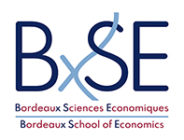Agenda > Tous les événements
2nd International Bordeaux Workshop in Quantitative Finance, Risk, and Decision Theory
organized by the “Bordeaux Banking and Finance Group”
Bank risk and firms’ financing
Résumé : In 2003, Castree proposed a conceptual framework to study the commodification processes of nature and the environment. Fifteen years later, literature has become abundant and multidisciplinary. The aim of this contribution is to present a review in social sciences of commodification processes (monetary valuation, marketization, privatization, etc.) of natural resources, ecosystems and the biodiviersity, to delineate the current state of knowledge, and to evaluate, with some historical perspective, the success of systematization attempts. The overall landscape seems to us to lack a truly renewed systemic ambition to understand commodification beyond its detailed forms. In particular, the construction of visual representations (we propose one in terms of ‘commodification chain’) would be useful to clarify the diverse perspectives.
The debate on the relationship between bank risk and firms’ financing continues to be of interest to economists and practitioners, especially when banking institutions are seeking to restore their margins that have melted away with the recent financial and sovereign debt crises. Previous researches and findings focused on this relationship through the role of the bank competition, risk profile of firms, governance structure of banks, etc. This workshop aims to widen the analysis of all factors impacting bank risk and firms’ financing nexus to the effects of the recent financial crisis, the role of unconventional monetary instruments, the implementation of a new banking regulation. Losing considerably their margins and undergoing important losses, banks may lend more to large companies because less risky in order to improve their risk profile, or, conversely, they may support at larger extent SME because the latter promise higher returns. Is there any difference among banks according to their risk profile? How lending is impacted according to company size (large and SME) during and after financial crises? How do banking institutions allocate the massive liquidity they receive from central banks through unconventional monetary policy? Which kind of firms takes more advantages of it? And what firms suffer more when such monetary support will stop? Alongside the effect of unconventional monetary policy on the relationship between bank risk and firms’ financing, the Basel 3 prudential regulation may, though the new capital and liquidity requirements, also impact the manner in which banks lend. But what are real effects? Are these unconventional monetary policies and prudential regulation acting in an opposite way on firms’ financing and which of firms (large or SME) take more advantages from such monetary policy and suffer more from such prudential regulation? The 2nd International Bordeaux Workshop in Quantitative Finance, Risk, and Decision Theory aims to provide answers to these questions, as well as to other issues concerning the relationship between bank risk and firms’ financing. The following non-exclusive topics are considered:
– New advances in bank risk measures
– Driven factors of risk-taking behaviour
– Bank capital, liquidity requirements and firms’ financing
– From Basel 2 to Basel 3: the impact on the relationship between bank risk and firms’ financing
– Other new perspectives impacting bank risk and bank lending to firms
– The specificities of systemically important banking institutions
– Etc.
Keynote session:
Leonardo Gambacorta (Bank of International Settlements)
Rainer Haselmann (Goethe-University, Frankfurt)
Scientific Committee:
Olivier Brandouy (University of Bordeaux) Valeriya Dinger (University of Osnabrück) Emmanuelle Gabillon (University of Bordeaux) David Grigorian (International Monetary Fund) Joanne Hamet (University of Bordeaux)
Bálint Horváth (University of Bristol) Ion Lapteacru (University of Bordeaux) Laetitia Lepetit (University of Limoges) Laurent Weill (University of Strasbourg)
Organizers:
Olivier Brandouy (University of Bordeaux) Emmanuelle Gabillon (University of Bordeaux) Joane Hamet (University of Bordeaux)
Ion Lapteacru (University of Bordeaux, workshop chairman)
Submission and Registration:
The workshop registration is free of charge. It includes coffee breaks and lunch as well as access to all the papers presented during the conference day (electronic version). Submissions and presentations have to be in English.
To submit a paper, please, send its full version in PDF format to Ion Lapteacru (ion.lapteacru@u-bordeaux.fr)
Submission deadline: September 15, 2017
Notification of acceptance: October 1, 2017



